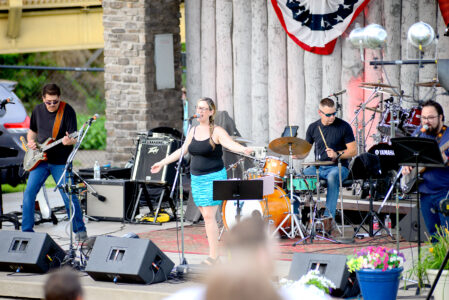Capito, Justice support Trump recission package in early Thursday vote
West Virginia Public Broadcasting officials awaiting answers on future funding
CHARLESTON — The U.S. Senate voted in the early morning hours Thursday for a recission package – supported by West Virginia’s two senators – clawing back billions of dollars in foreign aid and public broadcasting dollars.
But the future effects on local public broadcasters, including West Virginia Public Broadcasting, remains to be seen.
In a 2:30 a.m. vote of 51-48, the Senate approved House Resolution 4, the Recissions Act of 2025, after a vote-a-rama on amendments that began early Wednesday. The bill now goes back to the U.S. House of Representatives, which first approved the bill in a 214-212 vote one month ago.
The recissions package would claw back more than $9 billion in foreign aid and direct funding for the Corporation for Public Broadcasting that was already appropriated for the current federal fiscal year ending in October. Sens. Shelley Moore Capito and Jim Justice, both R-W.Va., voted for the resolution, releasing statements Thursday morning.
“Senate Republicans have listened to the American people who want us to rein in spending,” Capito said. “Senate Republicans responded by passing a rescissions package that eliminates wasteful spending, an important step towards getting America’s fiscal house back in order. The last four years saw example after example of misused taxpayer dollars. I am proud to support this legislation that takes a small but necessary step to rein in federal spending and save taxpayer dollars.”
“I’m proud to cast my vote for this commonsense rescission package – the days of wasting money with zero regard for the taxpayer are over,” Justice said. “This package helps keep folks’ tax dollars from being spent on out-of-touch nonsense on the other side of the world and keeps it where it should be: in the pockets of hardworking West Virginians. Under President Trump’s leadership, we are back to putting Americans first.”
The Senate version of the bill is slightly different than the House’s, requiring the House to approve the changes before the bill can head to the desk of President Donald Trump. The Senate version left in place $400 million for an anti-HIV program with global success, and certain foreign agriculture subsidies.
The recissions package would claw back more than $1.1 billion in funding already appropriated in fiscal years 2024 and 2025 for the Corporation for Public Broadcasting, leaving it with only $30 million. It comes after Trump’s May executive order calling for the CPB — the nonprofit founded by Congress in 1967 — to cease all direct and indirect funding of National Public Radio and the Public Broadcasting Service. NPR and several NPR member stations filed a federal lawsuit in June asking the courts to block Trump’s executive order and declare it unconstitutional.
Trump and congressional Republicans argue that federal funding for NPR and PBS is no longer needed due to the abundance of media options for consumers. They also accuse NPR and PBS of liberal/progressive media bias favoring Democratic politics and policies over Republican positions.
“Sometimes I will listen to (NPR) when I’m on my drive home. That National Public Radio is definitely leaning left,” Capito said Thursday afternoon on a conference call with West Virginia reporters. “The stories are very slanted, and we’ve been pleading with them to please be more objective. We’re not asking you to be conservative; we’re just asking to be objective, and the refusal to make changes really is quite astounding.”
Federal funding through CPB and other grants made up 18.8% of West Virginia Public Broadcasting’s $10.2 million budget in fiscal year 2024, according to its most recent annual report. Fiscal year 2024 federal funding for WVPB was $1.9 million. As of June, WVPB has received $1.6 million in funding through CPB.
“Most of the money that goes out … goes to the local affiliate,” Capito said. “I would like to see West Virginia Public Broadcasting … be able to sustain itself through other mechanisms, whether it’s more state funding or more donations. The national funding constitutes about 17% of their budget, which is sizable, but it’s not” impossible to overcome.
WVPB Executive Director Eddie Isom said there would be meetings with CPB over the next couple of weeks to discuss options for local public broadcasters going forward. But there remain unanswered questions about what the recission package could mean for WVPB and other local public broadcasters.
“There is a lot of uncertainty right now,” Isom said. “We’re just waiting and seeing and continuing our work. After we get better answers, maybe some hard decisions will have to be made.”
On Thursday’s call, Capito said that other federal lawmakers are still willing to work on solutions that can help local public broadcasters remain on the air and provide services despite their issues with CPB.
“We’re going to be working with them,” Capito said. “There are several (congressional) members that want to see that local flavor preserved. I think about ‘Mountain Stage.’ I think about the West Virginia history that we see on the TV and the great entertainment that many times we get through West Virginia public radio.”
The House has a deadline of midnight Friday to approve the Senate’s changes, though NPR reports that a coalition of local public media programs are continuing to advocate in the House for changes to the CPB clawback.



